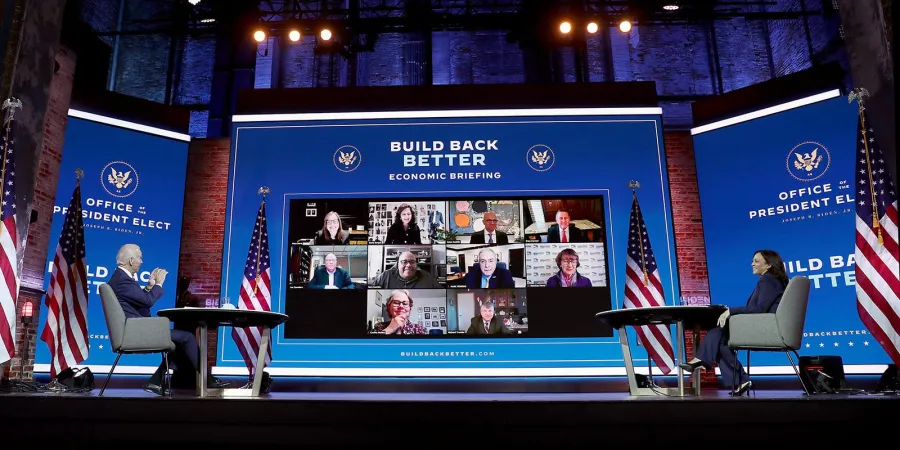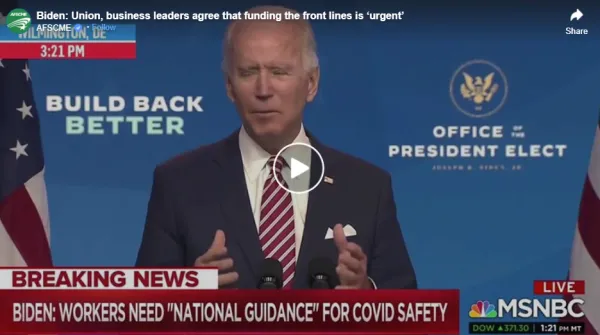Biden: Union, business leaders agree that funding the front lines is ‘urgent’

President-elect Joe Biden and Vice president-elect Kamala Harris on Monday brought together business and union leaders, including AFSCME President Lee Saunders, for a virtual meeting to discuss an economic recovery agenda for the country.
Following the meeting, Biden warned of a “dark winter” ahead for the nation and highlighted consensus among the labor leaders and CEOs alike on the need to fund the front lines.
“We all agreed on the urgent need for funding for states and localities to keep front-line workers and essential workers on the job,” he said at a press conference following the event.
“There’s a reason the federal government is able to run a deficit, and that’s because the states must, must, balance their budgets. And they’re in real trouble. You’re going to see hundreds of thousands of police officers, firefighters, first responders, mental health clinics – you’re going to see them going out of business,” Biden warned. “Right now, Congress should come together and pass a COVID-relief package like the Heroes Act that the House passed six months ago.”
AFSCME has been calling for exactly such an aid package since the spring. Through our Fund the Front Lines campaign, we have highlighted the work of public service workers who are risking their lives to save their communities, and have pressured Congress and President Donald Trump to help states, cities and towns continue to provide essential public services.
On the call with labor and business leaders, Saunders reiterated the need for the federal government to act now to provide relief to states, cities, towns and schools.
“It was six months ago yesterday that the House of Representatives passed the Heroes Act, a bold and comprehensive stimulus bill, designed to address one of the worst economic crises in American history. Six months and one day later, the bill is still stuck in the U.S. Senate,” he said.
About 1.5 million public sector jobs have been lost since February, and many more will be lost unless aid is extended to communities across America. Such aid would more than pay for itself and represents one of the most effective ways to spur economic growth. There has been consensus among economists across the ideological spectrum that such aid is a no-brainer.
“Without this federal assistance, everything that gives our communities vitality is threatened,” Saunders said. “It will mean our hospitals are overwhelmed and understaffed. It will mean our schools don’t have the tools to reopen safely for in-person learning. It will mean our water supply is compromised and our roads fall into disrepair.”

Other labor leaders who participated on the call were AFL-CIO President Richard Trumka; Mary Kay Henry, president of the Service Employees International Union; Rory Gamble, president of the United Auto Workers; and Marc Perrone, president of the United Food and Commercial Workers International Union. Participating business leaders were General Motors CEO Mary Barra, Microsoft President and CEO Satya Nadella, Target Chairman and Chief Executive Brian Cornell and Sonia Syngal, CEO of Gap.
Trumka talked about the need to keep workers safe from COVID-19 and the role that the Occupational Safety and Health Administration (OSHA) should play in achieving this end. The agency could “reestablish its mission,” he argued, “through an emergency temporary standard to protect workers from COVID-19.”
“For four years, OSHA has been AWOL. There’s been no full-time director,” Trumka said. “There are fewer inspectors today than at any point in the agency’s history. OSHA has been totally absent during this pandemic and workers across industries have been left to fend for ourselves.”
AFSCME and three other unions have sued OSHA to force the agency to adopt a health standard to protect workers from airborne diseases like COVID-19, Ebola and flu that spread by droplets.
Biden said he was encouraged by the unity among business and labor leaders at the meeting and was confident that such agreement could help the country regain its economic footing.
“When we build back better, we’ll do so with higher wages, including a $15 minimum wage nationwide, better benefits and stronger collective bargaining rights that you can raise a family on,” Biden said. “That’s how we build back the middle class better then ever. That’s how we make sure workers are treated with the dignity and respect they deserve.”
